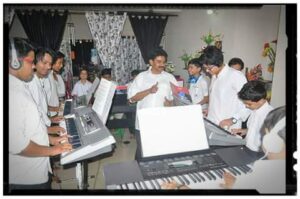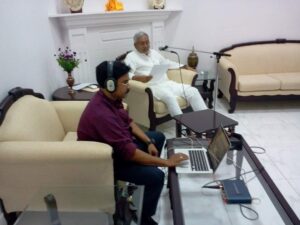This site is a great resource for Indian piano lessons for piano players who are just getting started, or have been playing for a while. Our videos will help you get started with the basics and also give you some inspirational ideas.
The idea of this site came when my students were searching for resources on Hindi Piano music and could not find much. Though there were plenty of Piano Sheet Music resources for Western Classical Music, but not much for Bollywood Hindi Songs.
So we decided to embark on this journey to write Sheet Music for old and new Hindi Bollywood Songs. You can learn to play your favorite Bollywood songs using the videos provided for each song. This is just my way of showing appreciation to the Musical Greats in Indian Cinema and making their music accessible to people.
I encourage you to join me on youtube and facebook where I do regular FREE live piano lessons, teach fun tips and tricks, and much more.
Benefits of learning the Piano
Because the piano is central to the composition of almost every music genre, learning how to play the piano can be a lifelong pursuit.
Whether you grew up in a musical family, encouraged to practice endless hours before recitals like I did or whether you claim the littlest musicality of anyone you know, there are unquestionable benefits to playing musical instruments, especially piano. Furthermore, studies show, it is truly never too late to start learning piano – the mental and physical benefits apply to all ages.
I could talk to you about the thousands of reasons we love playing the piano and why it benefits our lives, but lets’s face it I’m a little biased! Here are actually scientifically proven benefits to playing the piano :
Studies show that playing the piano improves mental health. People who play the piano tend to experience less anxiety and depression than their nonmusical counterparts. Playing for a few minutes a day can improve self-esteem, make you feel more positive, and can lower your blood pressure. FUN FACT: Piano lessons and playing are a common form of therapy used for ADD.
Playing the piano changes, the brain in a positive way! Studies show that music stimulates the brain in a way no other activity does. While playing a piece on the piano, you are adding new neural connections, which primes your brain for other forms of communication. So, while you think you are just working on a particularly tough piano piece, you are also improving your memory, attention, speech, language, spatial and math skills, and even the ability to vocally convey emotions.
FUN FACT: Practicing music at an early age can make structural changes to the brain that stay with you for the rest of your life.
Grade school students who take piano lessons have better general and spatial cognitive development than students who do not take lessons. Middle and high school students scored much higher on standardized tests than if they were involved in instrumental music. Took music lessons as a child? Good news! You’ll be better able to retain information in your college lectures.
In an increasingly frenetic world, it is more important than ever to be able to focus.
Playing the piano has been proven to help improve concentration, which helps in every area of life.
University studies conducted in Georgia and Texas found significant correlations between the number of years of instrumental music instruction and academic achievement in math, science and language arts. (University of Sarasota Study, Jeffrey Lynn Kluball; East Texas State University Study, Daryl Erick Trent)
FUN FACT: Children who study the piano for two years or more can remember 20%
more vocabulary words than their peers.
A study conducted by Martin F. Gardiner and his colleagues at the Center for the Study of Human Development at Brown University found that specialized musical training in specific increments toward greater difficulty boosted second graders’ math skills significantly above their peers.
Source: Brain Connection Education Week
Dr. Ana Pinho conducted a recent study on jazz pianists. Monitoring their brain activity while playing, she found that the part of their brain responsible for default or stereotypical responses was actually turned off. Instead, when jazz pianists are playing, their brains improvisation ability is firing to create unique, original sound and style.
Source: Mic & NCBI
As with any responsibility or hobby, learning to add it to your daily routine and make time to do it requires good time management. Playing piano and other instruments that demand a routine practice schedule are particularly effective in challenging one’s ability to manage and organize their time. For children, learning to play piano, juggling lessons, practice and fun play, is a great way to teach these lifelong skills.
Source: Ezine Articles
Multiple areas of the brain light up when playing music. Scientists studying the brains of musicians as they play music have found that the discipline of playing music is the equivalent of a full-body brain workout. Strengthening multiple areas of the brain, including our ability to concentrate, focus and apply knowledge, playing music allows us to exercise our brain similarly in other areas. So, it should not be surprising that starting to play piano will trigger increased patience, concentration and discipline.
Regular piano playing offers different physical and physiological advantages to players. It sharpens fine motor skills, improves dexterity and hand-eye coordination.
Music has also been shown to reduce heart and respiratory rates, cardiac
complications, and to lower blood pressure and increase immune response. Playing the piano also makes your hands and arm muscles much stronger than the average person. Prevents Brain Processing, Hearing and Memory Loss. The ability to process auditory signals usually slows down as we age. However, participants of a recent study who continued to play music throughout their lives had helped reverse the decline brain processing, memory and inner ear hearing loss. Source: ABC News
It is no surprise that learning to play piano requires hand-eye coordination, but a recent study on hand motor control in musicians suggests that piano performers have actually changed the cortical mapping to increase finger speeds. For children and adults with reduced motor skills, learning to play the piano can challenge these brain connections to motor movement and even strengthen coordination.
Source: Music and Health.
Split concentration, also called divided attention, is an integral part of playing the piano, which helps sharpen your concentration skills. To play the piano, one must use both hands, read music, listen to the notes you’re playing, and work the pedals. That’s a lot to do at once! Once you become adept at using split concentration at the piano, you will find your multitasking skills in the outside world also greatly improve.
Services we provide
For those of you who like to get a structured training, I also take online and offline classes, where I will help you learn the keyboard/piano fundamentals and give you plenty of fun exercises to get your fingers moving. If you want to appear for ABRSM or Trinity College London certifications, or just want to learn the piano to enjoy yourself, I will work with you all the way.
I offer individual keyboard/piano lessons both online and in my studio. Individual sessions work best for students who are passionate about music and are keen to learn the nuances of the instrument.
Group lessons are offered in my studio in a batch of 4-6 students. Keyboards are provided for these sessions.
I have arranged and recorded music for various commercials and Government initiatives.
For students keen on taking it up as a profession, I offer classes in my studio.
Customers reviews







